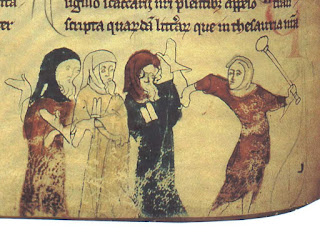According to the Dean of St. Paul's Cathedral, Ralph of Diceto (c.1120 - c.1202), when some Jews arrived with gifts, they were stripped, flogged, and thrown from the building. To the people outside Westminster Abbey, the rumor spread that the new king disapproved of Jews and wanted them killed.
Riots began immediately. The Jewish population of London was attacked. Many of the homes in the area called Old Jewry were made of stone, and could withstand attacks by ordinary citizens, but the solution was to set them on fire, killing those within. (Some non-Jewish homes were destroyed by fire as well.) Some Jews were forced to convert to Christianity. Among those killed was Jacob of Orléans, a tosafist or author of commentaries on the Talmud, who had left France to teach in England. Some Jews escaped London, while some fled to the Tower of London to request sanctuary. Some were sheltered by Christian friends.
Richard was furious: no one wants the start of their reign to be marked by a massacre. His desire to punish the perpetrators was curtailed by the fact that there were so many and that some were prominent citizens. He chose to punish specifically the destruction of certain property. Roger of Hoveden describes it thusly:
On the day after the coronation, the king sent his servants, and caused those offenders to be arrested who had set fire to the city; not for the sake of the Jews, but on account of the houses and property of the Christians which they had burnt and plundered, and he ordered some of them to be hanged.
Although Richard seemed not to care about the destroyed Jewish homes, he did allow forcibly converted Jews to return to their chosen faith. He made a royal writ saying Jews should be left alone—he was concerned about what would happen when he left the country, since he had already pledged to go on Crusade.
When he went on Crusade shortly after, however, there were more examples of anti-semitism, which I will share tomorrow.
